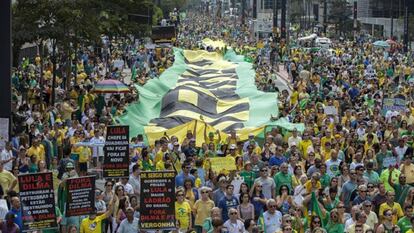Brazilians stage third march to demand president’s resignation
Thousands take to the streets of large cities as Rousseff’s approval rating stands at 8%

Fed up with their country’s economic crisis and public corruption scandals, thousands of Brazilians for the third time this year took to the streets in around 150 cities on Sunday to demand the resignation of leftist President Dilma Rousseff.
Demonstrators demanded an end to the government of the ruling Workers’ Party (PT), which has been in power since 2003 when Rousseff’s predecessor Luiz Inácio Lula da Silva began his first term as president.
A large portion of those who turned out on Sunday were from Brazil’s middle classes. Many were wearing green and yellow – the colors of the nation’s flag – and shouting “Out with Dilma” and “Out with the PT” as they marched throughout major cities.
Rousseff has lost support among many Brazilians who blame her for the cuts in social spending and services
Even though the turnout was impressive, the protests have lost momentum since the two previous massive demonstrations held on March 15 and April 12. Although there are no official figures, Military Police gave a preliminary estimate of about 800,000 demonstrators across the country.
Lula da Silva and other PT officials have been caught up in a series of political scandals that has tarnished the government’s image and angered Brazilians, who have been hit hard by an economic crisis fueled in part by soaring deficits and losses on the global oil market.
Last month, prosecutors announced that they had opened a formal inquiry into influence-peddling allegations against Lula da Silva. Investigators are trying to determine if the former president used his connections in other countries to help construction giant Oderbrecht improperly obtain work contracts.
At the same time a huge bribery-and-kickbacks scandal at state-owned oil company Petrobras has ensnared a host of leading politicians, including the speaker of the lower house of the Brazilian Congress, Eduardo Cunha – who reportedly accepted $5 million – and former government minister José Dirceu.
We need the army to come in to eliminate and close down Congress”
Dirceu, a one-time influential PT official, was arrested earlier this month. He had already been implicated in a congressional vote-buying scheme (the Mensalão inquiry) during Lula da Silva’s first term. That investigation is still ongoing.
Rousseff, who has denied any wrongdoing, has also not been able to deflect allegations that she knew about the payoffs to congressmen by Petrobras contractors – she served as head of the state-oil company during the Lula da Silva administration.
With only eight months into her second term, Rousseff has lost support among many Brazilians, who blame her for the cuts in social spending and services to deal with a soaring deficit.
Two organizers of Sunday’s marches – Vem Pra Rua (Take to the streets) and Movimiento Brasil Livre (Free Brazil Movement, MBL) – have focused their strategies on the fight against corruption and demanding Rousseff’s resignation.
Recent polls show that many Brazilians support impeachment proceedings against Rousseff, whose approval ratings stand at around eight percent. But many are still uncertain who could lead the country if Rousseff is removed from office, according to experts.
The streets of São Paulo appeared to attract the most people on Sunday. According to the Datafolha statistics institute, about 135,000 took part in the rally held on the city’s major thoroughfare, Paulista Avenue,
“The PT has robbed us, said 33-year-old Silvana. “We are here to express our indignation over the corruption that is taking place. We shouldn’t remain silent; we must fill the streets.”
In the capital Brasilia, around 25,000 came out to march with many people calling for the privatization of all public agencies. “They stole from Petrobras, and now it is ruined. If we could, we would privatize even the government,” said Josué Gomes, a retiree.
On Rio de Janeiro’s famous Copacabana beach, about 10,000 people also called for Rousseff’s resignation, with some even backing military intervention.
“We need the army to come in to eliminate and close down Congress,” said Teresinha Vitorin, a 53-year-old teacher.
Brazil was ruled by the military from 1964 to 1985.
Afonso Benites, María Martin and Marina Rossi also contributed to this story.
English version by Martin Delfin.
Tu suscripción se está usando en otro dispositivo
¿Quieres añadir otro usuario a tu suscripción?
Si continúas leyendo en este dispositivo, no se podrá leer en el otro.
FlechaTu suscripción se está usando en otro dispositivo y solo puedes acceder a EL PAÍS desde un dispositivo a la vez.
Si quieres compartir tu cuenta, cambia tu suscripción a la modalidad Premium, así podrás añadir otro usuario. Cada uno accederá con su propia cuenta de email, lo que os permitirá personalizar vuestra experiencia en EL PAÍS.
¿Tienes una suscripción de empresa? Accede aquí para contratar más cuentas.
En el caso de no saber quién está usando tu cuenta, te recomendamos cambiar tu contraseña aquí.
Si decides continuar compartiendo tu cuenta, este mensaje se mostrará en tu dispositivo y en el de la otra persona que está usando tu cuenta de forma indefinida, afectando a tu experiencia de lectura. Puedes consultar aquí los términos y condiciones de la suscripción digital.









































